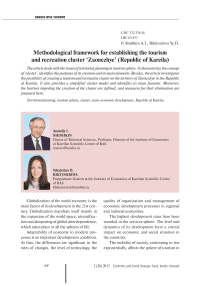Methodological framework for establishing the tourism and recreation cluster ‘Zaonezhye’ (Republic of Kareila)
Автор: Shishkin Anatoliy Ivanovich, Biktimirova Yekaterina Dmitriyevna
Журнал: Economic and Social Changes: Facts, Trends, Forecast @volnc-esc-en
Рубрика: Branch-wise economy
Статья в выпуске: 2 (26) т.6, 2013 года.
Бесплатный доступ
The article deals with the issues of territorial planning in tourism sphere. It characterizes the concept of ‘cluster’, identifies the purposes of its creation and its main elements. Besides, the article investigates the possibility of creating a tourism and recreation cluster on the territory of Zaonezhye in the Republic of Karelia. It also provides a simplified cluster model and identifies its main features. Moreover, the barriers impeding the creation of the cluster are defined, and measures for their elimination are proposed here.
Territorial planning, tourism sphere, cluster, socio-economic development, republic of karelia
Короткий адрес: https://sciup.org/147223460
IDR: 147223460
Список литературы Methodological framework for establishing the tourism and recreation cluster ‘Zaonezhye’ (Republic of Kareila)
- Arutyunov Yu. A. Formation of the regional innovation system on the basis of cluster model of the region’s economy. Corporate management and innovation development of the economy in the North: Bulletin of the research centre of corporate law, management and venture investment of the Syktyvkar State University, 2008. Vol. 4.
- Voynarenko M.P. Cluster in institutional economics: monograph. Khmelnitskiy: Khmelnitsky National University, ‘Triada-M’, 2011.
- The general plan of tourism infrastructure facilities in the development of the Scheme of territorial planning of the Republic of Karelia. Saint Petersburg, 2007.
- Klainer G.B. The first cluster. Tourism: practice, problems, prospects. 2009. No. 10. P. 17 -19.
- OJSC Corporation of Development of the Republic of Karelia. The Republic of Karelia, 2011.
- Marshall A. The foundations of economics: in 3 vol. Moscow, 1993. Vol. 1.
- Methodological recommendations on the implementation of cluster policy in the Northern regions of the Russian Federation. Available at: http://www.tpprf.ru.
- Report on the implementation of the research on the ‘Development of the Management Plan for the World Heritage Site ‘Kizhi Pogost (Russia S 544)’ from 2012 to 2022’ (contract No. 34/11 dated June 30, 2011).
- Shishkin A.A., Shishkin A.I. Organization, planning and management of construction production: education guidance. Petrozavodsk: Publishing house of Petrozavodsk State University, 2007.
- Porter M. Competition. Moscow, 2005.
- Strategy of innovation development of the Russian Federation for the period up to 2020. Available at: www.rg.ru/pril/63/14/41/2227_strategiia.doc
- Rosenfeld S.A Bringing business clusters into the mainstream of economic development. European planning studies. 1997. No 5. P. 3-23.
- Schmitz H. On the clustering of small firms. In: Flexible specialization: a new view on small industry. IDS Bulletin. No. 23(3). P. 64-69.
- Steiner M., Hartmann C. Looking for the Invisible: material and immaterial dimensions of clusters. Paper presented at the Regional Studies Association Annual Conference on ‘Regionalising the Knowledge Economy’, November 21, London, 2001.
- Toronto competes: an assessment of Toronto’s global competitiveness. City of Toronto. Economic Development Office, 2000.
- World Congress on local clusters: local networks of enterprises in the world economy. OECD: Paris, 23 -24 January 2001.


